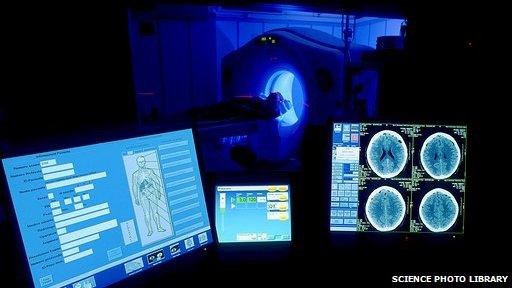Hospital coma guidelines require care for all patients
- Published

Prolonged disorders of consciousness are usually caused by a sudden brain injury
All patients in a coma or vegetative state should have access to specialist care, according to new guidelines.
The Royal College of Physicians is keen to address inconsistencies in the level of resources in hospitals around England and Wales.
Experts also want a patient register to help gauge numbers of patients with prolonged disorders of consciousness, which include coma, vegetative state and minimally conscious state.
There are no official figures on cases.
Derick Wade, professor of neurological rehabilitation at University College London, estimates there are fewer than 10,000 such cases a year but admits there could be more.
A register would track patients and record data to enable services to be planned "in a sensible and coherent way", he said.
Service inequality
The guidance recommends there should be at least one designated specialist team for assessing people with prolonged disorders of consciousness in each of the 12 healthcare regions in England.
Speaking at the launch of the report in London, Prof Wade said: "I hope that at the end of all this, we'll reduce the variation across England and Wales where at the moment you can get a brilliant service, a bad service or no service, so that everybody gets a reasonable service at least."
There is currently not enough capacity in the system to give every patient specialist evaluation and management, but that should be possible in two or three years, said Prof Lynne Turner-Stokes, consultant in rehabilitation medicine at Northwick Park Hospital, London.
The new guidelines, the first since 2003, explain who is responsible for making decisions about the care of patients, including end-of-life care.
Decisions about care planning and end-of-life management should be made by the responsible senior clinician on the basis of the patient's best interests, they state.
However, the guidance urges carers to seek the opinions of the family and other loved ones when deciding on the best course of action.
Anticipating patients' wishes
In any case where food and drink is to be withdrawn, a decision must be made by a judge of the Court of Protection.
Prof Turner-Stokes said people could help doctors by setting out their wishes in advance in what is called an advance decision to withdraw treatment.
"None of us ever thinks that this is going to happen to us, and yet it does happen to quite a number of people per year," she said.
"One of the difficulties that we face as clinicians and families, and indeed the courts, is trying to work out what the individual might have wanted, not having that information."
Dr Peter Carter, chief executive and general secretary of the Royal College of Nursing, said: "This guidance is much needed and has been informed by the nursing experience.
"It provides clarity and in-depth information in terms of treatment as well as emotional support and ethical considerations."
Dr Tony Calland, chairman of the BMA's medical ethics committee, added: "We hope the new guidance from the Royal College of Physicians will help clinicians - and those close to people with prolonged disorders of consciousness - to understand better some of the challenging clinical, ethical and legal issues that providing treatment to this very vulnerable group of patients can present."
- Published28 September 2011
- Published13 November 2012
- Published21 June 2011